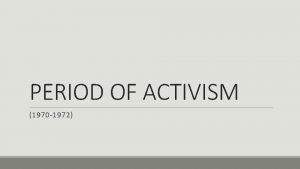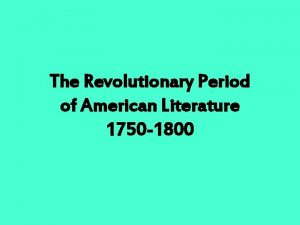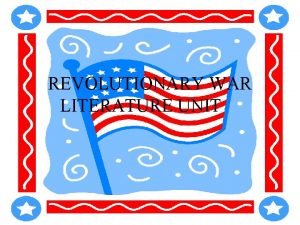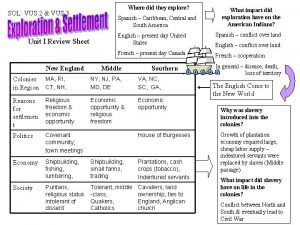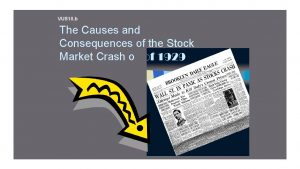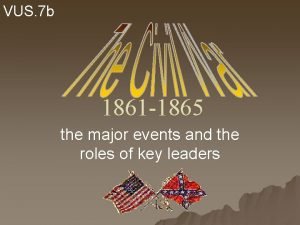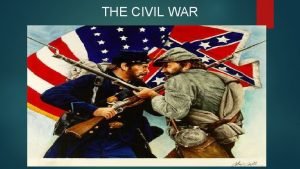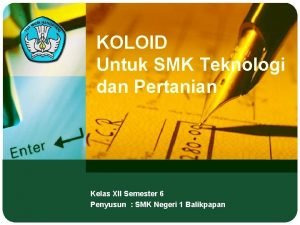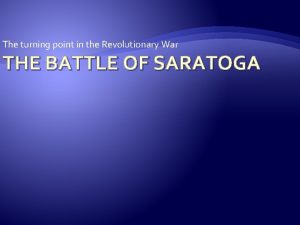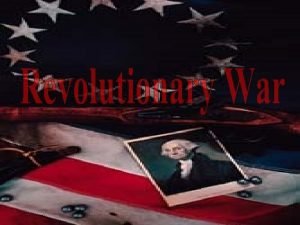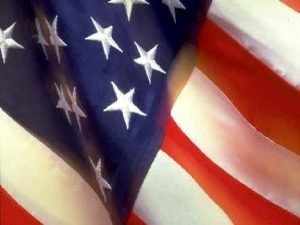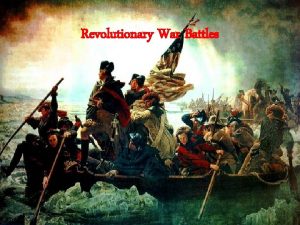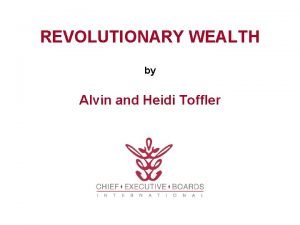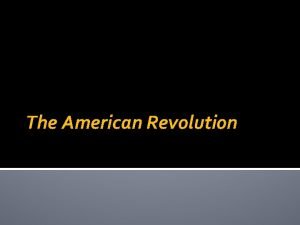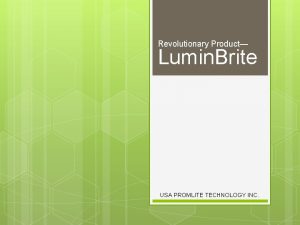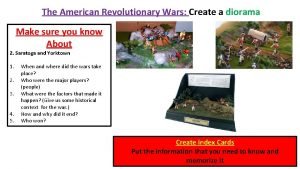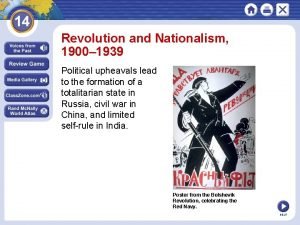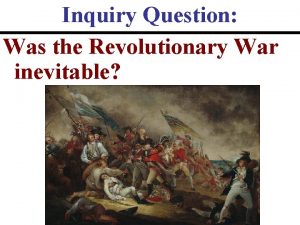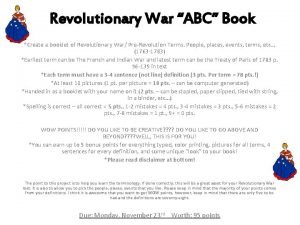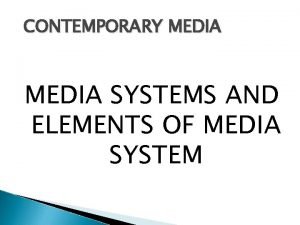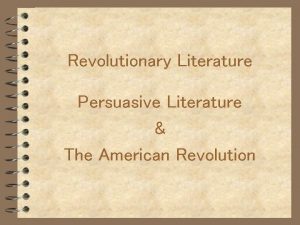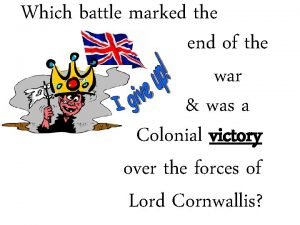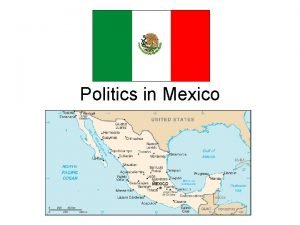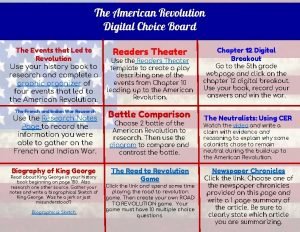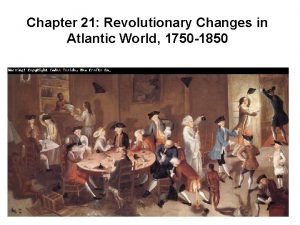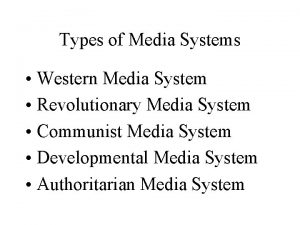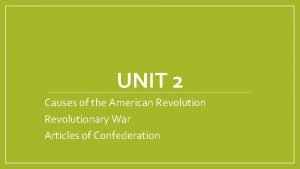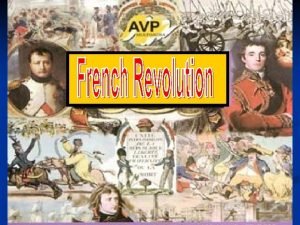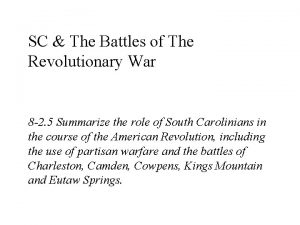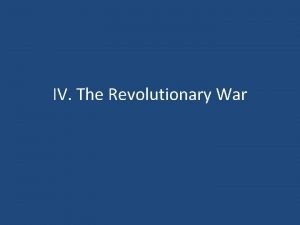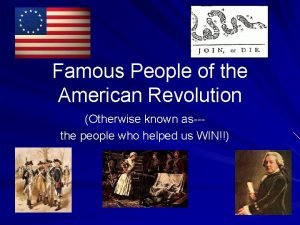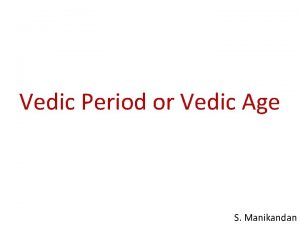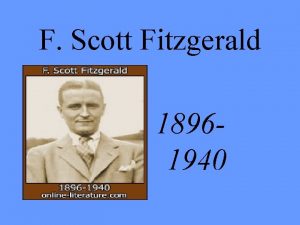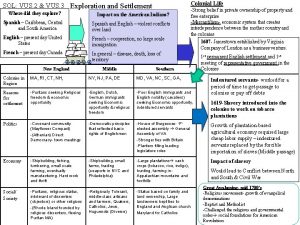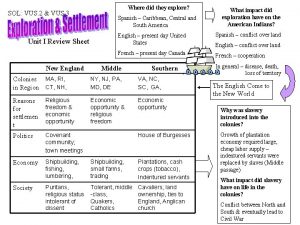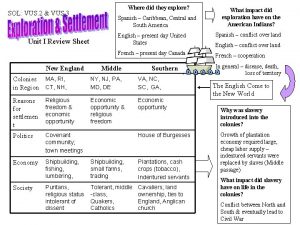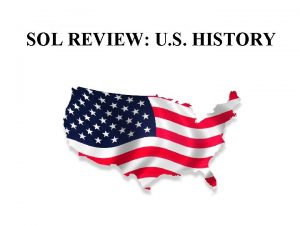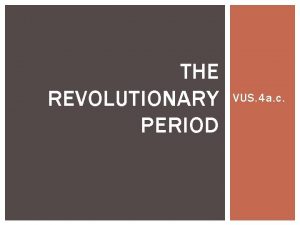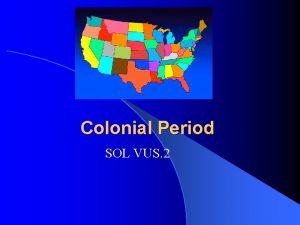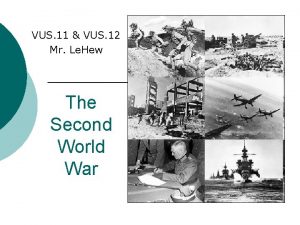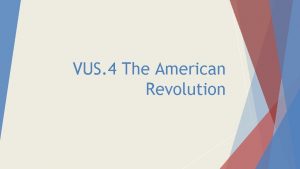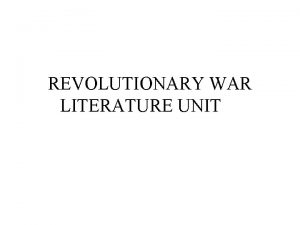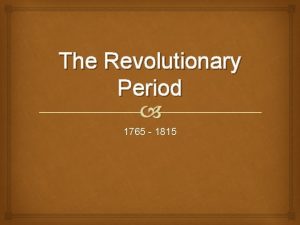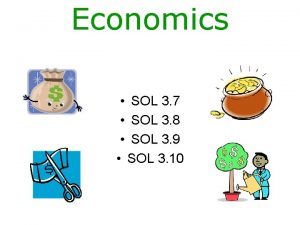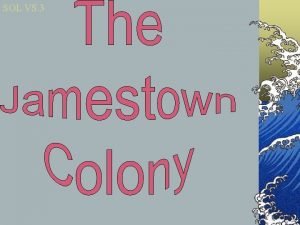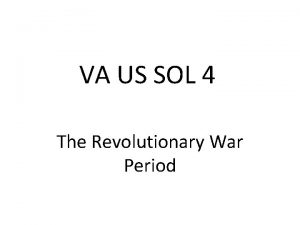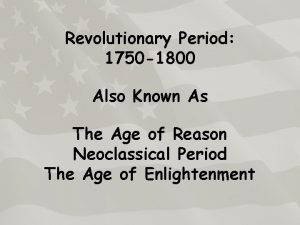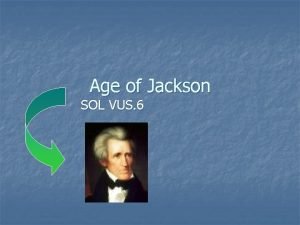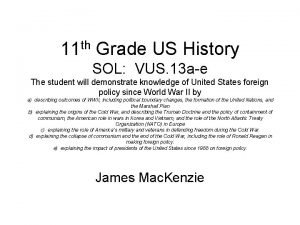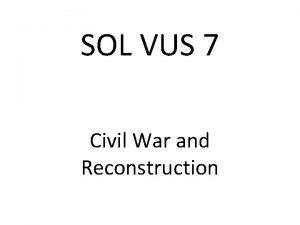Revolutionary Period SOL VUS 4 The period known
























































- Slides: 56

Revolutionary Period SOL VUS. 4

The period known as the “Enlightenment” in Europe during the 17 th and 18 th centuries saw the development of new ideas about the rights of people and their relationship to their rulers.


John Locke was an Enlightenment philosopher whose ideas, more than any other’s, influenced the American belief in selfgovernment.

Locke wrote that all people are free, equal, and have “natural rights” of life, liberty, and property that rulers cannot take away.

Locke believed that all original power resides in the people, and they consent to enter into a “social contract” among themselves to form a government to protect their rights.

John Locke believed that when people enter this “social contract” to form a government that they must promise to obey the laws and rules established by their government. This agreement establishes a system of “ordered liberty”.

In addition, Locke felt a government’s powers come from the people and are limited to those the people have given to it. Government exists to serve the needs of the people!

Locke further wrote that whenever government becomes a threat to the people’s natural rights, it breaks the social contract and the people have the right to alter or overthrow it.

Locke’s ideas about the sovereignty and rights of the people were radical and challenged the centuries-old practice throughout the world of dictatorial rule by kings, emperors, and tribal chieftains.


Thomas Paine was an English immigrant to America who produced a pamphlet known as Common Sense. This pamphlet challenged the rule of the American colonies by the King of England, George III.

Thomas Paine stated that George III was the cause of the colonies’ problems and urged Americans to declare their Independence.

Common Sense was read and acclaimed by many American colonists during the mid-1700 s and contributed to a growing sentiment for independence from England.


The eventual draft of the Declaration of Independence, authored by Thomas Jefferson of Virginia, reflected the ideas of Locke and Paine.

As you read the following passages from the Declaration of Independence, note the many ideas of Locke and Paine that are part of this document!

We hold these truths to be self-evident, that all men are created equal, that they are endowed by their Creator with certain unalienable rights, that among these are life, liberty, and the pursuit of happiness. “ That to secure these rights, governments are instituted among men, deriving their just powers from the consent of the governed. . . That whenever any form of government becomes destructive of these ends, it is the right of the people to alter or abolish it, and to institute new government. . . “

Jefferson then went on to detail many of the grievances against the king that Paine had earlier described in Common Sense.


The rivalry in North America between England France led to the French and Indian War.

As a result of the French and Indian War, the French were driven out of Canada and their territories west of the Appalachian Mountains.

In an attempt to recoup some of the costs of this war, England took several actions that angered the American colonies and led to the American Revolution.

One action that angered colonies was the Proclamation of 1763 which prohibited settlement west of the Appalachian Mountains, a region that was costly for the British to protect.

Other taxes passed to help pay costs incurred during the war and also to cover the cost for British troops kept to protect the colonists were the: • Stamp Act – a tax on legal documents • Taxes on tea and sugar


Resistance to British rule in the colonies mounted, leading to war.

The Boston Tea Party was staged.

The First Continental Congress was called, to which all the colonies except Georgia sent representatives. The significance of the First Continental Congress was the first time most of the colonies had acted together.

The Boston Massacre took place when British troops fired on anti-British demonstrators.

War began when the “Minutemen” in Massachusetts fought a brief skirmish with British troops at Lexington and Concord.

The colonists were divided into three main camps during the Revolution. Patriots Loyalists (Tories) Neutral

Patriots • Believed in complete independence from England • Inspired by the ideas of Locke and Paine and the words of Virginian Patrick Henry (“Give me liberty, or give me death!) • Provided the troops for the American Army, led by George Washington, also of Virginia

Loyalists (Tories) • Remained loyal to Britain, based on cultural and economic ties • Believed that taxation of the colonies was justified to pay for British troops to protect American settlers from Indian attacks

Neutrals • The many colonists who tried to stay as uninvolved in the war as possible!

There were several factors that led to the American victory in the American Revolution.

One major factor that led to victory was the Treaty of Alliance made with France that was negotiated by Benjamin Franklin.

George Washington, general of the American army, avoided any situation that threatened the destruction of his army. In addition, his leadership kept the army together when defeat seemed inevitable.

Americans benefited from the presence of the French army and navy at the Battle of Yorktown, which ended the war with an American victory.

The American rebels won their independence because the British government grew tired of the struggle soon after the French agreed to help the Americans.


1. Who was the author of Common Sense? Thomas Paine

2. What were the supporters of England known as? Loyalists or Tories

3. Who was the Enlightenment philosopher that influenced the Declaration of Independence? John Locke

4. Why did Thomas Jefferson write the Declaration of Independence? As a statement that the Americans were outraged by the actions of Britain that they felt violated their rights.

5. Why did the British levy new taxes on the colonies? They wanted to pay for the costs of the French and Indian War. What types of items did the British tax? legal documents, tea, sugar

6. What contributed greatly to an American victory in the American Revolution? the negotiation of the Treaty of Alliance with France

7. Why was George Washington effective as a military leader? He protected his army and kept the army together.

8. What did the Proclamation of 1763 prohibit? settlement of land west of the Appalachian Why did the British prohibit this settlement? It was costly to protect this area.

9. What were the unalienable rights mentioned in the Declaration of Independence? life, liberty, and the pursuit of happiness

10. How did the French and Indian War effect the French? They were driven from Canada and their territories west of the Appalachian Mountains.

11. Which state did not send representatives to the First Continental Congress? Georgia

12. In the Declaration of Independence, it is stated that governments derive their power from ___________. the consent of the governed

13. What did Thomas Paine challenge in the pamphlet, Common Sense? The rule of the American colonies by the King of England, George III

14. Where did fighting begin in the American Revolution? in Lexington and Concord

15. What were the people who believed in complete independence from England known as? Patriots
 What served as the seed of activism?
What served as the seed of activism? Revolutionary period of american literature
Revolutionary period of american literature Revolutionary war literature
Revolutionary war literature Greyhound vus
Greyhound vus Vus review
Vus review Vus.10b when was the stock market crash?
Vus.10b when was the stock market crash? Vus 7a what event sparked secession of the southern states?
Vus 7a what event sparked secession of the southern states? The civil war
The civil war Koloid liofob
Koloid liofob Turning point of the revolutionary war
Turning point of the revolutionary war British strengths during the revolutionary war
British strengths during the revolutionary war Music of the revolutionary war
Music of the revolutionary war Fort ticonderoga map
Fort ticonderoga map Revolutionary wealth
Revolutionary wealth Lemuel hayes revolutionary war
Lemuel hayes revolutionary war Revolutionary product
Revolutionary product American revolution interactive notebook
American revolution interactive notebook American revolution diorama
American revolution diorama Revolutionary leaders 1900-1939
Revolutionary leaders 1900-1939 Inquiry answer 12
Inquiry answer 12 Revolutionary war abc book
Revolutionary war abc book What is a media system
What is a media system American revolutionary literature
American revolutionary literature Which battle
Which battle Institutional revolutionary party
Institutional revolutionary party Revolutionary war choice board
Revolutionary war choice board Ssush
Ssush Famous virginians
Famous virginians Warchap
Warchap Chapter 21 revolutionary changes in the atlantic world
Chapter 21 revolutionary changes in the atlantic world American revolution jeopardy
American revolution jeopardy Revolutionary media system
Revolutionary media system Causes of the american revolutionary war
Causes of the american revolutionary war Revolutionary princess eve
Revolutionary princess eve Kings mountain battle map
Kings mountain battle map Continental army strengths and weaknesses
Continental army strengths and weaknesses American revolt
American revolt Revolutionary war british strengths and weaknesses
Revolutionary war british strengths and weaknesses The enlightenment influenced revolutionary thought by
The enlightenment influenced revolutionary thought by During the later vedic period chamberlain was known as
During the later vedic period chamberlain was known as Aspirationòthe
Aspirationòthe Thế nào là hệ số cao nhất
Thế nào là hệ số cao nhất Hệ hô hấp
Hệ hô hấp Tư thế ngồi viết
Tư thế ngồi viết đặc điểm cơ thể của người tối cổ
đặc điểm cơ thể của người tối cổ Cách giải mật thư tọa độ
Cách giải mật thư tọa độ Tư thế worm breton là gì
Tư thế worm breton là gì Bổ thể
Bổ thể ưu thế lai là gì
ưu thế lai là gì Tư thế ngồi viết
Tư thế ngồi viết Thẻ vin
Thẻ vin Cái miệng bé xinh thế chỉ nói điều hay thôi
Cái miệng bé xinh thế chỉ nói điều hay thôi Thể thơ truyền thống
Thể thơ truyền thống Các châu lục và đại dương trên thế giới
Các châu lục và đại dương trên thế giới Từ ngữ thể hiện lòng nhân hậu
Từ ngữ thể hiện lòng nhân hậu Diễn thế sinh thái là
Diễn thế sinh thái là Thế nào là giọng cùng tên?
Thế nào là giọng cùng tên?
